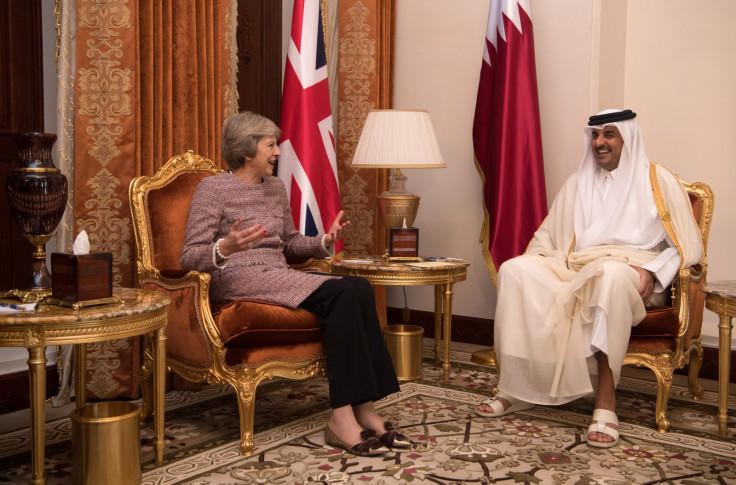Qatar supports terrorism - Britain must rethink its relationship
Qatar's double-faced diplomacy should no longer be tolerated.

The decision by major Arab allies of Britain against Qatar is a wake-up call for the country to reconsider its foreign policy.
Britain's largest trading partners in the Middle East – Saudi Arabia, the United Arab Emirates, Egypt and Bahrain – were joined by other regional states in cutting diplomatic relations with the tiny Gulf city-state of Qatar. The Arab states were later joined by Jordan, which downgraded its relationship with Qatar.
For over 20 years, those states – key partners to the West in the war against terrorism – have encouraged Qatar to shun its support for Islamist terror.
They have long accused Qatar of being a supporter of Islamist terrorism. The accusations include Qatari channels and media outlets, such as the Arabic-language channel Al Jazeera, of being a platform for terrorists. Indeed, Osama Bin Laden's channel of choice was Al Jazeera. The Arab action against Qatar includes severing economic ties.
At this time, it is extremely important for Britain to take sides. Not only is taking the sides of the moderate Arab states in Britain's direct interests, it is also the moral thing to do. In an age when Britain needs to forge trade deals in a post-Brexit world, Britain cannot afford to lose favour with its key Arab partners.
Granted, Qatar is also an important trade partner to Britain. But trade between Britain and Qatar is less than a tenth of that with the other Arab states. Qatar's allegiances, in its expressing admiration for Islamist terror groups, have become very clear.
Qatar must be strongly encouraged to change the path it has chosen. Britain must re-evaluate its relationship should Qatar choose not listen.
The evidence of Qatar's role in supporting terrorism is overwhelming. Shortly after the Riyadh Summit, Qatar's Emir choose to reach out to Iran and, in no uncertain terms, expressed admiration for Hezbollah and Hamas.
Although Qatar said its media has been hacked, it has not denied claims it expressed support for the terror groups. This in itself is mind-boggling as Qatar has previously been criticised by Western officials for supporting al-Qaeda-affiliated rebel groups in Syria.
Qatar is also home to the spiritual head of the Muslim Brotherhood, Yousof Qaradawi, who was banned from entering Britain in 2008 because of his support of suicide attacks. Indeed, Qaradawi is considered one of the most influential advisers to the Qatari Emir.
Qatar's double-faced diplomacy is no longer tolerated amongst the Middle East's moderate states – key allies to Britain and the West.
The moderate countries of the Middle East are pushing Qatar to change its course before it can be rehabilitated. Britain cannot stand by and watch.The Manchester and London terrorist attacks show it is imperative for the UK to investigate what is really going on.
Qatar and Qatari state-affiliated entities hold key strategic investments in Britain. A report in March 2017 showed that Qatar owns three times more of London than the Queen. It owns, for example, the London 2012 Olympic Village and Harrods. Qatar owns 20% of the shares of British Airways owner IAG. In March 2017, Qatar said it planned to invest £5bn in UK infrastructure.
Surely a country that is accused of supporting terrorism cannot be allowed to hold such sway in Britain?
While foreign investment to Britain is welcome, particularly post-Brexit, it should not come at the risk of undermining Britain's security and other more important strategic relations. Those Qatari investments put Britain at odds with its traditional Middle East allies, who have much more to invest in Britain, but without the political baggage Qatari money bring.
It is not only the government's responsibility to look at Qatari investments in Britain. Private companies in Britain should also be strongly encouraged to investigate who they are dealing with. The political risk to those private entities can be significant, not only within Britain, but also with moderate Middle Eastern countries.
Past accusations levied against Qatar of sponsoring terrorist groups, coupled with the recent reaching out to Iran, should ring alarm bells in London. Qatari sovereign investments in Britain come at a price. That price may be Britain's very stability.
It is a risk not worth taking and a price too high to pay.
Ghanem Nuseibeh is founder of Cornerstone Global Associates and a senior visiting fellow at Kings College, London.
© Copyright IBTimes 2025. All rights reserved.






















